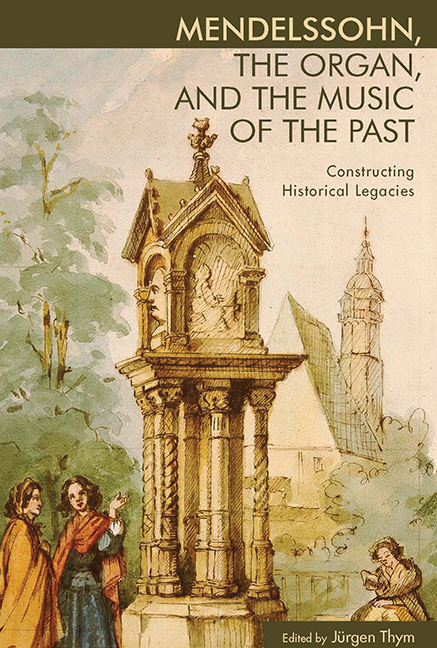Book contents
- Frontmatter
- Dedication
- Contents
- Acknowledgments
- Introduction: Of Statues and Monuments
- Part One Composition and Tradition
- Part Two Mendelssohn and the Organ
- Part Three Mendelssohn's Inherited Legacies in Context
- 8 The Bach Tradition among the Mendelssohn Ancestry
- 9 Music History as Sermon: Style, Form, and Narrative in Mendelssohn's “Dürer” Cantata (1828)
- 10 Mendelssohn's “Authentic” Handel in Context: German Approaches to Translation and Art and Architectural Restoration in the Early Nineteenth Century
- 11 Beyond the Ethical and Aesthetic: Reconciling Religious Art with Secular Art-Religion in Mendelssohn's “Lobgesang”
- 12 Mendelssohn's Religious Worlds: Currents and Crosscurrents of Protestantism in Nineteenth-Century Germany and Great Britain
- List of Contributors
- Index
11 - Beyond the Ethical and Aesthetic: Reconciling Religious Art with Secular Art-Religion in Mendelssohn's “Lobgesang”
from Part Three - Mendelssohn's Inherited Legacies in Context
Published online by Cambridge University Press: 14 March 2018
- Frontmatter
- Dedication
- Contents
- Acknowledgments
- Introduction: Of Statues and Monuments
- Part One Composition and Tradition
- Part Two Mendelssohn and the Organ
- Part Three Mendelssohn's Inherited Legacies in Context
- 8 The Bach Tradition among the Mendelssohn Ancestry
- 9 Music History as Sermon: Style, Form, and Narrative in Mendelssohn's “Dürer” Cantata (1828)
- 10 Mendelssohn's “Authentic” Handel in Context: German Approaches to Translation and Art and Architectural Restoration in the Early Nineteenth Century
- 11 Beyond the Ethical and Aesthetic: Reconciling Religious Art with Secular Art-Religion in Mendelssohn's “Lobgesang”
- 12 Mendelssohn's Religious Worlds: Currents and Crosscurrents of Protestantism in Nineteenth-Century Germany and Great Britain
- List of Contributors
- Index
Summary
The ethical absolute does not rob life of its beauty; rather, it alone makes life beautiful. It gives life security and peace, for it is always calling to us: “what you are seeking is here.” It protects us from all weakening sentimentality; it gives the soul health and strength.
—Judge Vilhelm, Either/OrThe ethical is just as boring in life as it is in learning. What a difference! Beneath the sky of the aesthetic everything is light, pleasant and fleeting; when ethics comes along everything becomes hard, angular, and unending ennui.
—Johannes the Seducer, Either/OrIt has long been customary to use binary divisions to describe Mendelssohn or divide his oeuvre into two—more often than not with wildly contrasting evaluations attached to each part. Greg Vitercik, for instance, calling upon the imprimatur of George Bernard Shaw and Donald Tovey, speaks of “two Mendelssohns”—the “immensely talented, vigorously original” Mendelssohn of the Octet (MWV R20, op. 20), Hebrides, and Midsummer Night's Dream overtures (MWV P7 and P3, opp. 26 and 21); and a “pseudo-Mendelssohn” of the “Lobgesang” (MWV A18, op. 52), St. Paul (MWV A14, op. 36), and Elijah (MWV A25, op. 70), those “platitudinous monuments to early Victorian seriousness.” From a rather less judgmental perspective, John Toews has similarly characterized a dualism in Mendelssohn's work between his “secular, instrumental, ‘humanist’ music in which he presented himself as the heir of Haydn, Mozart, and Beethoven” and the “German Protestant tradition of sacred liturgical music.” In fact, for all the familiar orchestral and chamber masterpieces and the more selectively known piano works and songs, there exists beyond the two oratorios and the wings of countless doves an enormous body of liturgical and religious music few ever hear (or hear about).
What Vitercik's comment clearly delineates is the often ideological nature of this division and its rootedness in a conflict—or rather apathy—between proponents valorizing predominantly secular “aesthetic” qualities, with their affiliated emphasis on artistic progressivism and individual subjectivity, and the religious or broadly speaking “ethical” elements of Mendelssohn's music, with their corresponding appeal to intersubjective comprehensibility and social function.
- Type
- Chapter
- Information
- Mendelssohn, the Organ, and the Music of the PastConstructing Historical Legacies, pp. 287 - 309Publisher: Boydell & BrewerPrint publication year: 2014

